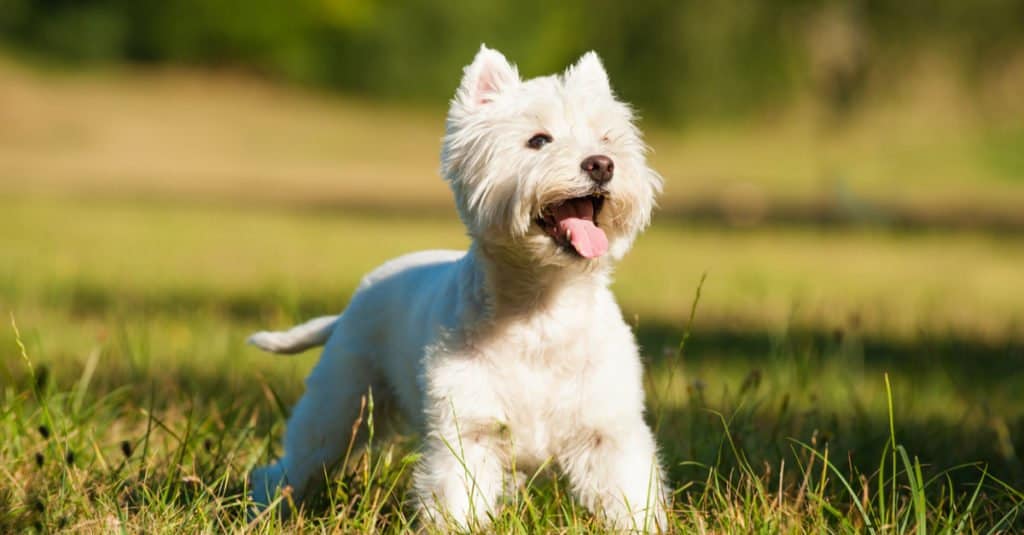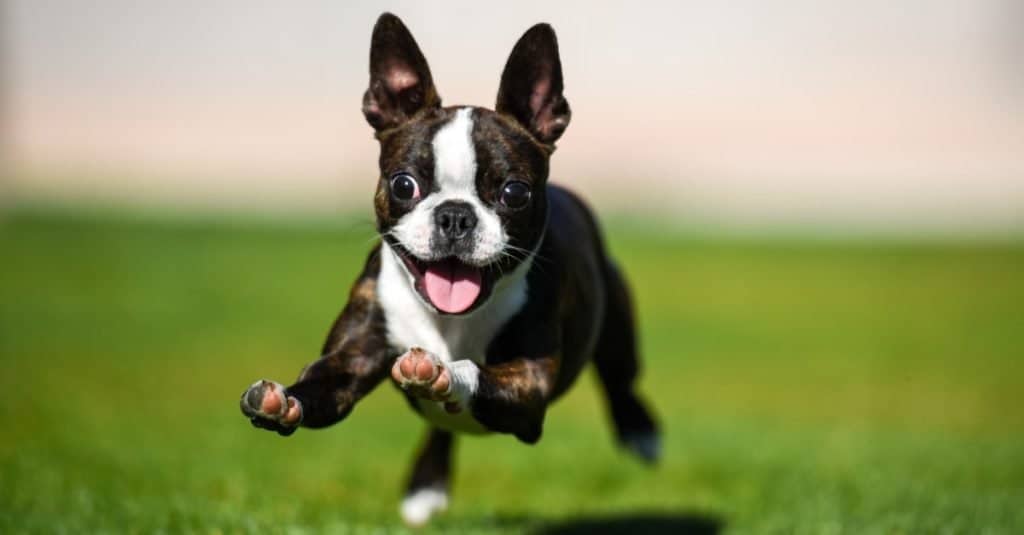Terriers share many characteristics and personal traits. For example, many terrier breeds come from England. However, some members of the breed, like the Kerry blue terrier, originated in Ireland. Many people believe terriers are the perfect companions; some make excellent guard dogs due to their protective natures. But not all are good with children and other pets. One thing they all have in common is their active natures and need for activities. Many still retain traits from their original purposes, like hunting vermin or dog fighting. Therefore, they may have a high prey drive. But what were terriers bred for? Continue reading to discover their original roles, jobs, history, and more.
Terrier Characteristics
| Characteristic | Value |
|---|---|
| Preferred Temperature | Warm climate |
| Shedability | 3 |
| General Health | 4 |
| Size | 2 – 3 |
| Energy Level | 4 |
| Exercise needs | High |
| Friendly with other dogs | Low |
| Family and kid-friendliness | 3 |
| Trainability and obedience | 4 |
| Temperament | Friendly, intelligent, playful |
| Yappiness and barking | 4 |
| Tendency to chew | 4 |
| Purebred cost to own | $500 to $3000 |
| Dog Group | Working |
| Used for hunting | Yes |
| Intelligence | 5 |
| Hypoallergenic (nonshedding) | No |
| Life span | 15 |
| Female Weight | 30 to 35 pounds |
| Male Weight | 35 to 40 pounds |
| Separation anxiety | High |
| Fun fact | Terriers derived their name from the Latin word “terra, ” meaning earth. It refers to this breed’s love of digging after their prey, consisting of small burrowing mammals. |
Evolution and Origins of a Terrier
Terriers are descendants of a small selection of ancestors. Today their work is relatively redundant, but they are immensely popular as pets all over the world. These dogs originated on the British Isles and evolved to meet man’s needs. Breeders developed terriers to catch vermin, making them extremely popular. They derived their name from the Latin word “terra, ” meaning earth. It refers to this breed’s love of digging after their prey, consisting of small burrowing mammals.
As time went on, terriers evolved to cope with new challenges. For example, their body size and shape changed with industrialization and the need for pest control in urban environments, which required smaller dogs. Therefore, smaller terriers were developed. As a result, some of the most popular terriers around the globe include the West Highland white Terrier, the Parson Russell terrier, and the border terrier. However, many breeds are considered terriers but do not form part of the original group, like pit bull terriers or Staffordshire bull terriers. While these breeds are descendants of terriers, they are also mixed with bull breeds.

The West Highland terrier ranks amongst the most popular terriers in the world.
©Dora Zett/Shutterstock.com
Different Types of Terriers and Terrier Mixes
There are many types of terriers and terrier mixes, including the following:
Types of Terriers
- Yorkshire Terrier
- Kerry Blue Terrier
- Australian Terrier
- Airedale terrier
- Border Terrier
- American Staffordshire Terrier
- Bedlington Terrier
- American Hairless Terrier
- Bull Terrier
- Cesky Terrier
- Dandie Dinmont Terrier
- Irish Terrier
- Jack Russell Terrier
- Pit Bull Terrier
- Rat Terrier
- Scottish Terrier
- West Highland White Terrier
- Staffordshire Bull Terrier
- Welsh Terrier
- Boston Terrier
- Cairn Terrier
- Fox Terrier
- Norwich Terrier
- Skye Terrier
- Wheaten Terrier
Terrier Mixes
- Jack Chi (Jack Russell terrier and Chihuahua mix)
- Frenchton (French bulldog and Boston terrier mix)
- Whoodle (Poodle and Wheaton terrier mix)
3 Pros And Cons Of Owning Terriers
| Pros | Cons |
|---|---|
| Pros | Cons |
| Independent | Separation anxiety |
| Intelligent | Excessive barking |
| Easily trained | Not good with other pets |
The Best Food for a Terrier
Since each terrier breed is unique, they have different dietary requirements, making it difficult to establish what foods are right for your terrier. However, a common issue amongst the breed is stomach sensitivity and allergies, so natural foods without grains are the best option.
Vegetables, Brown Rice, and Oats
This combination of foods is beneficial to all breeds. So, if you are cooking your dog’s food at home, you must include a mixture of healthy ingredients like oats, brown rice, and vegetables. For example, you can combine fresh vegetables like potatoes, and carrots, with a handful of oats and brown rice. In addition, you can make a sort of stew by adding boiled meat. Furthermore, several terrier breeds tend to overeat, especially the bull terrier. Therefore, you need to ensure you are not overfeeding them.
Wet or Dry Dog Food
Dry dog food is good for keeping your pup’s teeth strong and clean, improving their dental health, so most vets recommend it. For example, Yorkshire terriers are susceptible to early tooth decay, and bacteria can enter their bloodstream, which is extremely dangerous. However, some terriers do better on wet food since it’s a good source of water. Some terriers don’t drink enough water, so feeding them wet food keeps them hydrated.
Home Cooking
If you make your own dog food at home, you can ensure it is free of fillers and additives, which cause terriers to get sick or irritates their stomachs. This is especially true for the Jack Russell and West Highland white terriers. When cooking food for your dog, only use 100% meat. If you are unsure what to add to their meals, consult your trusted veterinarian for food recipes and determine which supplements to add for optimal health.
Foods To Avoid
While each breed has its own nutritional needs, grains are hard to digest for all terriers, so avoid foods like corn or wheat at all costs. When dogs find it difficult to digest grains, it leads to upset stomachs or after-meal grouchiness. Furthermore, some breeds are allergic to grains, so it’s best to leave them off your shopping list. Additionally, Boston terriers tend to have allergies to white rice, soy, yeast, and acidic foods.

Boston terriers tend to have allergies to white rice, soy, yeast, and acidic foods.
©Zero Degrees Photography/Shutterstock.com
Size And Weight of a Terrier
Many people think terriers are small-sized dogs because the most popular breeds are smaller in size, like the Jack Russell or Boston terrier. However, the group includes several larger breeds, like Airdales or Amerian Stafford terriers.
Average Size and Weight of Small Terrier Breeds
Small terrier breeds typically are shorter than 16 inches and weigh less than 22 pounds.
Average Size and Weight of Medium Terrier Breeds
Medium terrier breeds are generally between 18 to 25 inches tall and weigh around 25 to 50 pounds.
Average Size and Weight of Large Terrier Breeds
Large terrier breeds measure between 30 to 32 inches tall and weigh approximately 35 to 65 pounds.
Terrier Common Health Issues
While this breed is relatively healthy, some, like the Boston terrier, have hereditary health concerns all owners should be aware of:
- Heart murmurs
- Skin issues like pyoderma, dermatitis, pattern baldness, and demodectic mange
- Eye problems like dry eye, cataracts, eye injuries, glaucoma, distichiasis, corneal ulcers, entropion, dystrophy, and cherry eye.
- Orthopedic problems like hemivertebrae, hip dysplasia, patellar luxation, craniomandibular osteopathy, arthritis, and Legg-Calve-Perthes disease.
- Reproductive problems because of their large heads, physical build, and wider shoulders, most Boston terriers need to be delivered by C-section.
- Heart diseases like patent ductus arteriosus and mitral valve disease
- Deafness
- Allergies
- Dental disease
- Epilepsy
- Cancer
- Cushing’s disease
- Megaesophagus
- Urinary tract infection
- Ear infections
- Pyloric stenosis
Terrier Temperament
Temperament will depend on the type of terrier. However, most are fun and active and enjoy going on adventures or playing games. This makes them perfect for active owners who have time to exercise with their pups. Because these dogs were bred to hunt vermin, they are very alert and usually get along with animals smaller than them, like cats.
Terriers are notorious for their tenacity and bravery. However, these traits can land in trouble, so owners must always supervise them when out. While these dogs love their owners, they aren’t cuddly animals. In addition, they may be weary of strangers, so they need socialization and obedience training from a young age. Barking is another trait they tend to carry from their vermin hunting days. Especially the terriers bred for hunting underground, as they needed to alert their owners if they got stuck. Therefore, it is not unusual for this breed to bark when excited or stressed.
If you are an avid gardener, then terriers probably aren’t for you. Most of them tend to dig, especially when bored. Furthermore, these dogs may act out by tearing or ripping anything in sight if they are understimulated.
Terriers and Children
Unfortunately, not all terriers are good with children. For example, the smaller terriers are more prone to biting, aggressive behavior, or nips when excited. However, breeds like the West Highland white terrier, Staffordshire bull terrier, and wheaten terrier are great with kids.
Dog Breeds Similar to Terriers
- Pembroke Welsh Corgi
- Basenji
- Miniature Poodle
- Dachshund
Popular Names for Terriers
- Max
- Jack
- Daisy
- Bella
- Buddy
- Lilly
- Penny
- Milo
- Zoe
- Charlie
- Zoe
- Cooper
- Maggie
- Luna
- Roxy
- Rocky
- Molly
- Bailey
- Toby
- Tucker
Famous Terriers
- Soccer from the children’s show Wishbone
- Moose, who played Eddie on Frasier
- Barkley from the movie, The Little Magician
- Terry, who played Toto in the 1939 adaptation of The Wizard of Oz
- Max played Milio in The Mask with Jim Carrey
The photo featured at the top of this post is © alexei_tm/Shutterstock.com
Ready to discover the top 10 cutest dog breeds in the entire world?
How about the fastest dogs, the largest dogs and those that are -- quite frankly -- just the kindest dogs on the planet? Each day, AZ Animals sends out lists just like this to our thousands of email subscribers. And the best part? It's FREE. Join today by entering your email below.
Thank you for reading! Have some feedback for us? Contact the AZ Animals editorial team.






